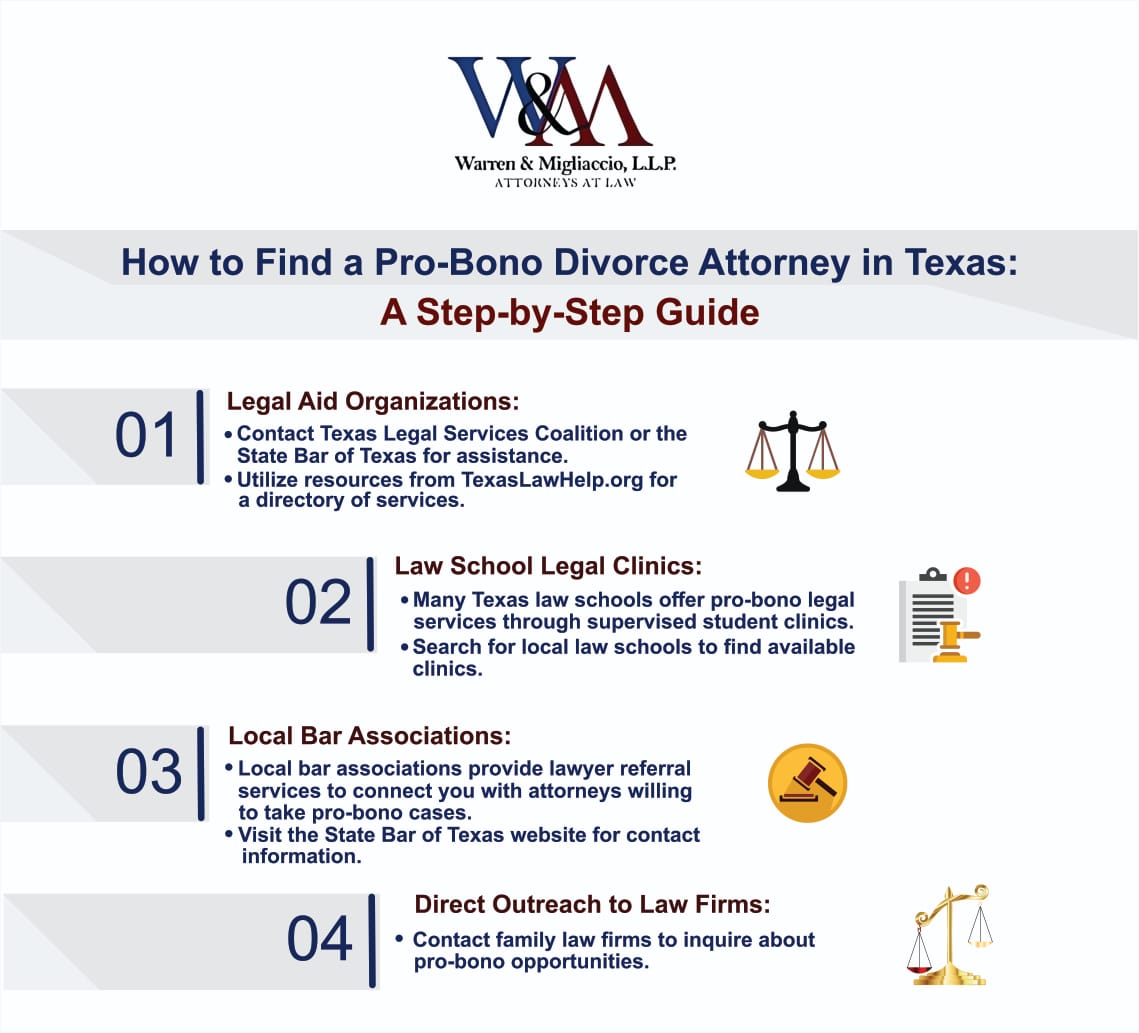Going through a divorce can be a stressful and expensive experience. In Texas, like many other states, the cost of hiring a qualified attorney to represent you in a divorce can be a significant financial burden. If you are facing a divorce and have limited financial resources, you may be considering seeking legal representation from a pro-bono attorney.
This blog post, written by Christopher Migliaccio, an attorney and founding partner at Warren & Migliaccio, L.L.P. – a Richardson, TX law firm specializing in family law matters like divorce and child custody – will guide you through the process of finding a pro-bono divorce attorney in Texas. We will discuss what pro-bono legal services are, explore different methods for locating a pro-bono attorney, and answer frequently asked questions to empower you to make informed decisions during this challenging time.
What is Pro-Bono Legal Representation?
Pro bono, a Latin phrase meaning “for the good,” refers to legal services provided without charge. Pro-bono attorneys are licensed lawyers who volunteer their time and expertise to represent low-income individuals who cannot afford legal representation.
 Who Qualifies for Pro-Bono Legal Services?
Who Qualifies for Pro-Bono Legal Services?
There is no one-size-fits-all answer to this question. Eligibility for pro-bono legal services typically depends on your income level and the specific circumstances of your case. Many legal aid organizations have income eligibility guidelines established based on the federal poverty guidelines published annually by the U.S. Department of Health and Human Services.
Here are some questions to consider regarding your eligibility:
- What is your current income? Do you fall within the federal poverty guidelines for your household size? You can find the current guidelines.
- Do you have any assets (such as a house or car) that could be used to pay for legal representation?
- Is your case complex or straightforward? Complex cases, involving significant assets or child custody disputes with extensive evidence gathering, may be less likely to be accepted pro-bono.
Methods for Finding a Pro-Bono Divorce Attorney in Texas
Finding a pro-bono divorce attorney requires some legwork and persistence. Here are some methods to consider:
- Legal Aid Organizations: Texas has a network of legal aid organizations. They provide various legal services, including family law assistance, to low-income residents. You can find a directory of legal aid organizations by visiting the Texas Legal Services Coalition website or contacting the State Bar of Texas Legal Access Division at 1-800-204-2222, ext. 1855.
- Law School Legal Clinics: Many Texas law schools operate legal clinics staffed by law students supervised by licensed attorneys. These clinics often provide pro-bono legal services to low-income individuals on various legal matters, including divorce. You can find a directory of law school legal clinics in Texas by searching online. Likewise, you can also contact the law school nearest to you.
- Local Bar Associations: Many local bar associations in Texas have lawyer referral services. They can connect you with an attorney who may be willing to take your case pro-bono. You can find contact information for your local bar association through the State Bar of Texas website.
- TexasLawHelp.org: This website, a joint project of the Texas Legal Services Coalition and the Texas Bar Foundation, provides a wealth of information on legal issues in Texas, including divorce. It also includes a legal help directory. This can help you find legal aid organizations and other resources in your area.
- Contacting Law Firms Directly: While less common, you can reach out to law firms specializing in family law and inquire about pro-bono opportunities. It’s important to understand that most law firms have limited resources for pro-bono work. However, some firms may consider your case pro-bono if the details resonate with them and align with their areas of expertise, or if a previous pro-bono case is nearing resolution, freeing up resources.

What to Expect When Seeking Pro-Bono Representation
Due to the high demand for pro-bono legal services, there is no guarantee that you will be able to find an attorney to take your case pro-bono. Here are some additional factors to consider:
- Wait times: The process of finding a pro-bono attorney can take time. Be prepared to make multiple calls and inquiries.
- Caseload: Pro-bono attorneys typically carry a heavy caseload, which may limit the amount of time and attention they can devote to your individual case. Be prepared to be patient and understanding with communication delays.
- Limited Scope Representation: In some instances, an attorney may be willing to accept your case on a “limited scope” basis. This means they may agree to represent you for specific aspects of your divorce, such as the filing of initial paperwork or mediation, but not the entire process.
- Screening Process: Legal aid organizations and law school clinics often have a screening process to determine eligibility for pro-bono services. This may involve submitting documentation to verify your income and the details of your case.
Additional Considerations
- Free Consultation with Warren & Migliaccio, L.L.P.: While we may not be able to take your case pro-bono, our firm, Warren & Migliaccio, L.L.P., offers a free consultation to discuss your divorce and explore available options. You can call us at (888) 699-2598 to schedule an appointment.
- Importance of an Attorney in Divorce Proceedings: Even if you are considering pursuing a pro-bono attorney, consulting with a qualified family law attorney can be beneficial. An attorney can provide valuable guidance on the Texas divorce process. He can explain your legal rights and options and help you understand the consequences of your decisions.
- Texas Family Code: The Texas Family Code outlines the laws governing divorce and other family law matters in the state. You can find the Texas Family Code online at the Texas Legislature website.

Frequently Asked Questions (FAQs) About Pro-Bono Divorce Attorneys in Texas
What if I don’t qualify for pro-bono legal services?
If you don’t qualify for pro-bono representation, there are several resources available that can help you. Here are a few options:
- Texas Lawyers for Texas Veterans: This program provides legal assistance to low-income veterans in Texas on various legal matters, including divorce.
- Reduced Fee Representation: Some attorneys may be willing to offer reduced fees for individuals who cannot afford their standard rates.
- Self-Help Resources: The Texas Law Help website offers a variety of self-help resources on divorce, including downloadable forms and instructions.
What documents should I bring to a consultation with a pro-bono attorney?
If you are able to secure a consultation with a pro-bono attorney, be prepared to bring any relevant documents related to your divorce, such as marriage certificates, financial statements, and child custody agreements (if applicable).
What happens if I cannot find a pro-bono attorney?
If you are unable to find a pro-bono attorney, you may need to represent yourself in your divorce proceedings. This can be a challenging process, but there are resources available to help you, such as the self-help resources mentioned above.
Conclusion
Finding a pro-bono divorce attorney in Texas requires initiative and perseverance. By utilizing the resources outlined in this blog post, you can increase your chances of securing an attorney to assist you during your divorce. Remember, even if you cannot find pro-bono representation, there are still ways to navigate the divorce process. Consulting with a qualified family law attorney can provide valuable guidance and ensure you understand your rights and options.

